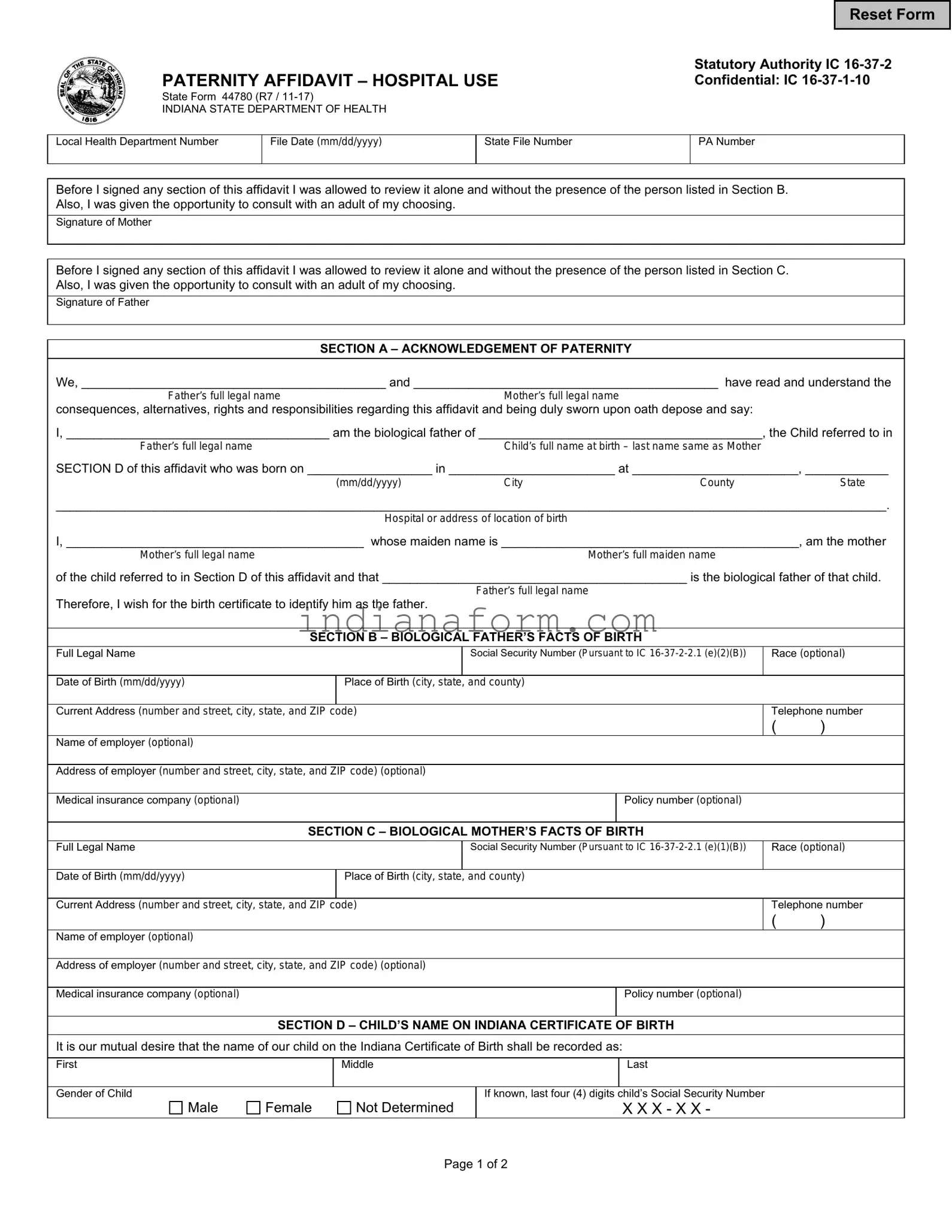PATERNITY AFFIDAVIT – HOSPITAL USE
State Form 44780 (R7 / 11-17)
INDIANA STATE DEPARTMENT OF HEALTH
Local Health Department Number |
File Date (mm/dd/yyyy) |
State File Number |
|
|
|
Reset Form
Statutory Authority IC 16-37-2 Confidential: IC 16-37-1-10
PA Number
Before I signed any section of this affidavit I was allowed to review it alone and without the presence of the person listed in Section B. Also, I was given the opportunity to consult with an adult of my choosing.
Signature of Mother
Before I signed any section of this affidavit I was allowed to review it alone and without the presence of the person listed in Section C. Also, I was given the opportunity to consult with an adult of my choosing.
Signature of Father
SECTION A – ACKNOWLEDGEMENT OF PATERNITY
We, ____________________________________________ and ____________________________________________ have read and understand the
Father’s full legal name |
Mother’s full legal name |
consequences, alternatives, rights and responsibilities regarding this affidavit and being duly sworn upon oath depose and say:
I, ______________________________________ am the biological father of _________________________________________, the Child referred to in
Father’s full legal nameChild’s full name at birth – last name same as Mother
SECTION D of this affidavit who was born on __________________ in ________________________ at ________________________, ____________
(mm/dd/yyyy)CityCountyState
________________________________________________________________________________________________________________________.
Hospital or address of location of birth
I, ___________________________________________ whose maiden name is ___________________________________________, am the mother
Mother’s full legal nameMother’s full maiden name
of the child referred to in Section D of this affidavit and that ____________________________________________ is the biological father of that child.
Father’s full legal name
Therefore, I wish for the birth certificate to identify him as the father.
SECTION B – BIOLOGICAL FATHER’S FACTS OF BIRTH
Full Legal Name |
|
|
Social Security Number (Pursuant to IC 16-37-2-2.1 (e)(2)(B)) |
|
Race (optional) |
|
|
|
|
|
|
|
|
|
|
Date of Birth (mm/dd/yyyy) |
|
Place of Birth (city, state, |
and county) |
|
|
|
|
|
|
|
|
|
|
|
Current Address (number and street, city, state, and ZIP |
code) |
|
|
|
|
|
Telephone number |
|
|
|
|
|
|
|
|
( |
) |
Name of employer (optional) |
|
|
|
|
|
|
|
|
|
|
|
|
|
|
|
|
|
|
Address of employer (number and street, city, state, and ZIP code) (optional) |
|
|
|
|
|
|
|
|
|
|
|
|
|
Policy number (optional) |
|
|
Medical insurance company (optional) |
|
|
|
|
|
|
|
|
|
|
|
|
|
|
|
SECTION C – BIOLOGICAL MOTHER’S FACTS OF BIRTH |
|
|
Full Legal Name |
|
|
Social Security Number (Pursuant to IC 16-37-2-2.1 (e)(1)(B)) |
|
Race (optional) |
|
|
|
|
|
|
|
|
|
Date of Birth (mm/dd/yyyy) |
|
Place of Birth (city, state, |
and county) |
|
|
|
|
|
|
|
|
|
|
|
Current Address (number and street, city, state, and ZIP |
code) |
|
|
|
|
|
Telephone number |
|
|
|
|
|
|
|
|
( |
) |
Name of employer (optional) |
|
|
|
|
|
|
|
|
|
|
|
|
|
|
|
|
|
|
Address of employer (number and street, city, state, and ZIP code) (optional) |
|
|
|
|
|
|
|
|
|
|
|
|
|
Policy number (optional) |
|
|
Medical insurance company (optional) |
|
|
|
|
|
|
|
|
|
|
|
|
|
|
|
SECTION D – CHILD’S NAME ON INDIANA CERTIFICATE OF BIRTH |
|
|
It is our mutual desire that the name of our child on the Indiana Certificate of Birth shall be recorded as: |
|
|
|
|
|
|
|
|
|
|
|
First |
|
Middle |
|
|
|
Last |
|
|
|
|
|
|
|
|
|
|
Gender of Child |
|
|
|
If known, last four (4) digits |
child’s Social Security Number |
|
|
Male |
Female |
Not Determined |
|
|
|
X X X - X X - |
|
|
Local Health Department Number
SECTION E – NOTICE OF CONSEQUENCES, ALTERNATIVES, RIGHTS AND RESPONSIBILITIES
By signing this affidavit, I acknowledge that I have read and understand all of the following:
1.A man should NOT sign this form if he is not sure he is the biological father. I may seek a genetic test before signing this form. Signing a Paternity Affidavit is voluntary. I may not be able to reverse paternity and the legal responsibilities of support associated with it, once I sign a Paternity Affidavit.
2.I may sign a Paternity Affidavit at the local Health Department at any time before the child’s emancipation, as long as there is no father listed on the birth certificate.
3.A woman who knowingly or intentionally falsely names a man as the child’s biological father commits a Class A misdemeanor.
4.I received both written and verbal information about the legal effects of signing a Paternity Affidavit.
5.Since this form has legal consequences, I may want to consult an attorney before signing.
6.This affidavit is void if signed more than seventy-two (72) hours after the birth of the child or if signed after the mother has executed a consent to adoption and a petition to adopt has been filed.
7.If I am the presumed father and do not establish paternity now, but want the right to notice and a hearing regarding any adoption of the child, I must register with the Indiana Putative Father Registry through the Indiana State Department of Health.
8.If the mother is receiving or plans to receive public assistance (TANF or Medicaid), she may be required to cooperate in establishing paternity and obtaining a support order or face losing those benefits.
9.If I do not sign a Paternity Affidavit and am unsure about the paternity of the child, I may contact the Prosecuting Attorney’s office in my county for help establishing paternity. They will help arrange tests to establish paternity.
10.The custodial party may contact the Prosecuting Attorney’s Office in their county for the child support services below through the IV-D program.
● |
Establishing paternity |
● |
Getting a court order for the payment of child support and medical support |
● |
Finding the absent parent |
● |
Enforcing child support and medical support orders |
11.The completion of this legal document establishes paternity with no further court action required and gives the mother or the IV-D agency the right to obtain a child support order requiring the father to pay support.
12.The father will have parenting time as outlined by the Indiana Parenting Time Guidelines, unless a court rules differently. See www.in.gov/judiciary/rules/parenting.
13.A man has the right to withdraw/rescind his acknowledgment of paternity only within sixty (60) days of the date the Paternity Affidavit is completed. To do so he must file an action in a court with jurisdiction over paternity and may need to submit to and pay for genetic testing per IC 16-37-2-2.1(k- l). After sixty (60) days the father may not be able to reverse paternity, even if genetic tests prove he is not the biological father.
Signature of Mother
Signature of Father
Date (mm/dd/yyyy)
Date (mm/dd/yyyy)
SECTION F – ESTABLISHMENT OF JOINT LEGAL CUSTODY
If both mother and father agree, they may complete this section of the Paternity Affidavit to elect to share joint legal custody of the child named in Section D. Joint legal custody means both mother and father share authority and responsibility for the major decisions concerning the child’s upbringing, including the child’s education, health care and religious training. Also mother and father have equal access to the child’s school and medical records.
(Both signatures are required to share joint legal custody.)
I wish to share joint legal custody of this child with the father listed in Section B of this affidavit.
Signature of Mother (go to 2, then 3): ____________________________________________________
I wish to share joint legal custody of this child with the mother listed in Section C of this affidavit. Signature of Father (go to 2, then 3): _____________________________________________________
2.If you have chosen to share joint legal custody, the mother still has primary physical custody of the child unless another determination is made in a
court proceeding under Indiana Code 31-14. |
Initials of Mother: _________ Initials of Father: _________ |
3.If you agree to share joint legal custody, you MUST submit the results of a genetic test, performed by an accredited laboratory no later than sixty (60) days after the child’s birth, that indicate the father listed in Section B is the biological father of the child. Otherwise, your agreement to share joint legal custody will be void. However the establishment of paternity IS still VALID. Initials of Mother: _________ Initials of Father: _________
4.  I do NOT wish to share joint legal custody of this child and I understand this affidavit may still be used to establish paternity if the other sections are properly completed. (Only one signature is required but both may sign.)
I do NOT wish to share joint legal custody of this child and I understand this affidavit may still be used to establish paternity if the other sections are properly completed. (Only one signature is required but both may sign.)
Signature of Mother (go to 5): ____________________________________________________
Signature of Father (go to 5): ____________________________________________________
5.If you have chosen NOT to share joint legal custody, the mother has SOLE legal custody unless another determination is made in a court proceeding under Indiana Code 31-14. However the establishment of paternity (SECTIONS A - E) IS still VALID.
Initials of Mother: _________ Initials of Father: _________
Subscribed and sworn to before me, the undersigned, a Notary Public, in and for said county, this ________ day of _______________, 2________.
Signature of Notary
Printed Name of Notary
My Commission Expires (mm,dd,yyyy)
County of Residence




 I do
I do